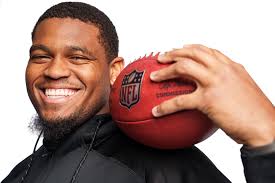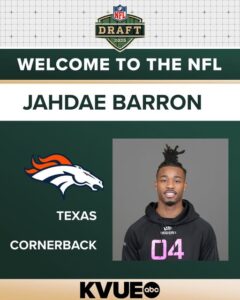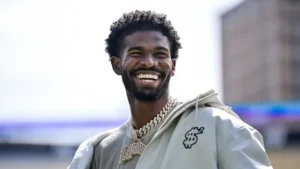
The Detroit Lions “have never entertained” the possibility of dealing WR, according to Brad Holmes. Williams, Jameson
The Detroit Lions have undergone significant changes over the last several seasons, transitioning from a rebuilding team to one that has serious aspirations of competing at the highest level. This process has been marked by smart decisions, player development, and an overall shift in culture under the leadership of general manager Brad Holmes. One of the most prominent and pivotal elements of the Lions’ rebuild has been their emphasis on the wide receiver position, and none have embodied this shift more than Jameson Williams, the electric wideout who was drafted by the Lions in 2022.
In recent months, Brad Holmes, the Lions’ general manager, made a clear statement regarding the team’s stance on Williams, which has resonated deeply within the organization and the fanbase. Holmes remarked that the team had “never entertained” the possibility of dealing Jameson Williams, emphasizing that the wide receiver is a crucial part of the Lions’ long-term vision. This statement was significant for a variety of reasons, as it dispelled any potential rumors or speculation that Williams could be traded, and instead reinforced the team’s belief in his immense potential as a key piece of their future.
Williams’ journey to Detroit was one that came with both excitement and some uncertainty. Widely regarded as one of the most talented and dynamic wide receivers in his draft class, Williams was selected by the Lions with the 12th overall pick in the 2022 NFL Draft. The selection was seen as a statement by the Lions about their desire to get younger and faster on offense, especially considering that Williams had showcased game-changing speed and big-play potential during his time at Alabama. He had proven to be a deep threat with the ability to take the top off of defenses, an attribute that made him an ideal fit for the Lions’ offensive scheme.
However, Williams’ rookie season was far from typical. After a long recovery from a torn ACL, which he sustained in the College Football Playoff National Championship, Williams did not debut for the Lions until midway through the 2022 season. As a result, his impact during his first year in the NFL was limited, but even in his limited appearances, he showed flashes of brilliance. Williams’ natural speed, ability to separate from defenders, and playmaking skills were evident, and it was clear that, once fully acclimated, he had the potential to become one of the league’s premier wideouts.
Brad Holmes’ comment about “never entertaining” the idea of trading Williams speaks volumes about the direction the Lions want to take as a franchise. The organization has made it clear that it views Williams not only as a potential star but also as a key component of the team’s offensive future. While the NFL is often a league where trades happen frequently, and player movement is a normal part of the landscape, Holmes’ remarks signal a level of commitment and long-term vision. The Lions are building something special in Detroit, and they believe Williams is an integral part of that vision.
Holmes’ confidence in Williams is not misplaced. In his first full season with the Lions, Williams showed significant development, building chemistry with quarterback Jared Goff and creating a dangerous dynamic in the passing game. His ability to stretch the field and demand attention from opposing defenses opened up opportunities for other players on the offense, including standout wide receiver Amon-Ra St. Brown, tight end Sam LaPorta, and running back David Montgomery. With a deep threat like Williams in the lineup, the Lions’ offensive scheme could become even more potent, with Goff having the ability to pick apart defenses in a variety of ways.
Furthermore, Williams’ skill set perfectly complements the Lions’ desire to be a high-powered offense that can score quickly and efficiently. In today’s NFL, teams that can stretch the field with speed and precision are often the most dangerous, and Williams gives the Lions that ability. His speed is truly elite, and when he’s on the field, he forces defenses to account for him at all times, whether on deep routes, crossing patterns, or even in the screen game. This is particularly important for a team like the Lions, who are looking to elevate their offense to compete with the best teams in the league, especially in a competitive NFC North division.
The Lions’ commitment to Williams also reflects their belief in his potential to be much more than just a deep threat. While Williams’ ability to take the top off of defenses is his most well-known skill, he has shown that he’s capable of more. In his rookie season, despite the limited opportunities, he demonstrated solid route-running ability, a knack for making contested catches, and an ability to make defenders miss in the open field. These qualities make him an ideal candidate to develop into a complete receiver who can be effective in all phases of the passing game. As he continues to grow and refine his game, it’s easy to see why the Lions would view him as a cornerstone player for the future.
Holmes’ decision to prioritize Williams’ development and firmly reject any notion of trading him underscores the broader strategy that the Lions are taking with their roster. The team has made it clear that it is focused on building a sustainable winner, and keeping key pieces like Williams around is a fundamental part of that. While the NFL is often a league driven by win-now mentalities, the Lions appear to be taking a more patient, measured approach, focusing on developing their young talent into long-term contributors. By keeping Williams as a foundational piece, the Lions are signaling their commitment to building something that can contend for championships for years to come.
Additionally, Brad Holmes’ comments also illustrate the broader cultural shift within the organization. The Lions are no longer a team that constantly finds itself in a rebuilding cycle. Instead, they are a franchise that is focused on establishing a winning culture and nurturing its young players to help them reach their full potential. Holmes’ recognition of Williams’ value and his insistence that the team is not considering trading him is a sign of the Lions’ newfound stability and commitment to the long-term development of their roster.
Of course, some would argue that, in today’s NFL, no player is completely untouchable. The league is filled with stories of once-untouchable players being traded for the right price. However, Holmes’ statement about Williams seems to be more than just lip service. It reflects the belief that, at this point in the team’s trajectory, they can’t afford to part ways with a player who could become a franchise cornerstone. While the Lions could theoretically explore trade options in the future, it’s clear that, as of now, Williams is an essential part of their plans and vision moving forward.
It’s also worth noting that Williams is not the only key player on the Lions’ roster that the team is committed to. Over the past few seasons, Detroit has made several strategic moves to bolster its roster, including drafting players like Amon-Ra St. Brown, Penei Sewell, and Aidan Hutchinson. These players, along with Williams, represent the core of the team’s future. By locking down players like Williams, the Lions are giving themselves the best chance to build a sustainable, competitive team that can contend for championships for years to come. It’s a far cry from the days when the team was known for its inconsistency and inability to build a true contender.
In conclusion, Brad Holmes’ assertion that the Lions “have never entertained” the idea of trading Jameson Williams speaks volumes about the organization’s vision for the future. It reinforces the idea that the team is committed to its young, talented players and is focused on building a team that can compete at the highest level. Williams’ skill set, work ethic, and potential make him an invaluable asset to the Lions, and Holmes’ comments highlight the belief that he is a key part of the team’s long-term plans. As the Lions continue to develop and refine their roster, Williams’ role will only become more significant, and his contributions will be vital to the team’s success. The commitment to players like Williams signals a shift in the culture of the franchise, one that is focused on building a competitive, sustainable winner, and it bodes well for the future of the Detroit Lions.





